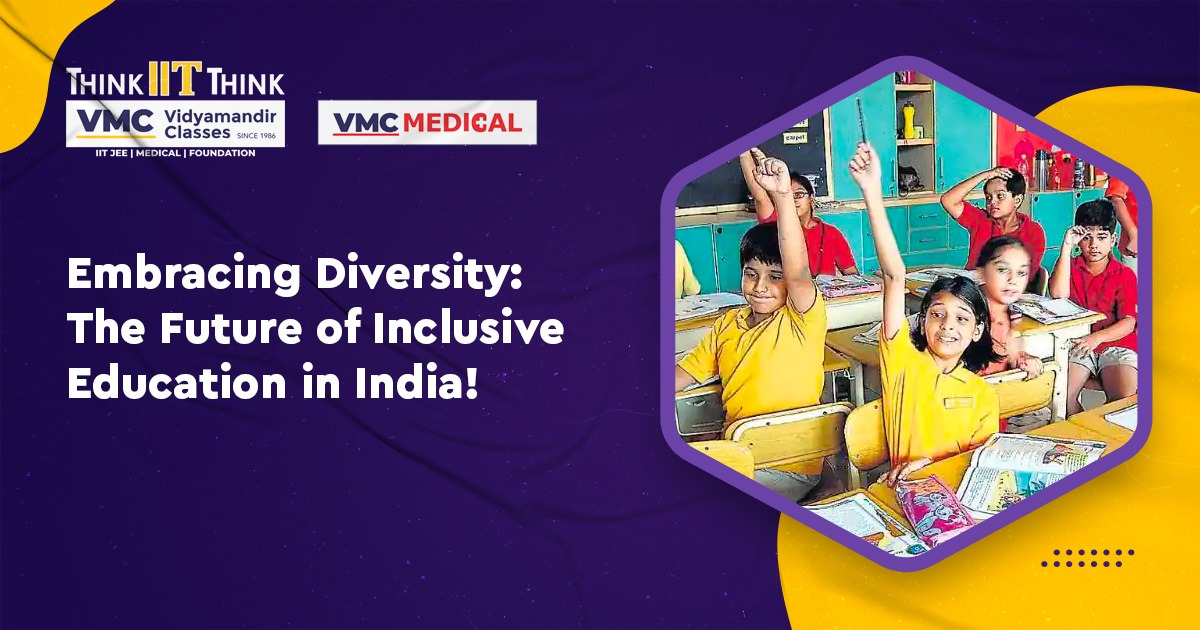Embracing Diversity: The Future of Inclusive Education in India!
 Posted On
Posted On
1,199 total views, 3 views today
Unlocking a country’s potential and empowering its population depends on education. Inclusive education, in particular, plays a vital role in creating a society where every individual, regardless of their abilities, socio-economic background, or any other characteristic, can access quality education. In India, the concept of inclusive education is gaining momentum, and it holds the promise of transforming the educational landscape. This blog explores the future of inclusive education in India, the challenges it faces, and the potential it holds in fostering a more equitable and progressive society.

Understanding Inclusive Education
Inclusive education is a transformative approach that seeks to provide equal opportunities and support for all students, regardless of their diverse needs. It aims to create an environment where students with disabilities, socio-economic disadvantages, cultural differences, and different learning styles can learn together in mainstream schools. Inclusive education goes beyond merely integrating students with special needs; it encourages schools to adapt their teaching methodologies, curricula, and infrastructure to cater to the diverse needs of all learners.
The Shift Towards Inclusivity
Over the years, India has witnessed a gradual shift towards inclusive education. This transformation is primarily driven by several factors:
- Legislation: The Right to Education Act (2009) made elementary education a fundamental right for all children between the ages of 6 and 14. The act also emphasized the importance of inclusive education and advocated for the integration of children with disabilities into mainstream schools.
- International Commitments: India is a signatory to various international conventions, including the United Nations Convention on the Rights of Persons with Disabilities (UNCRPD), which obliges the country to ensure inclusive education for all.
- Advocacy and Awareness: Non-governmental organizations, activists, and educators have been actively promoting the importance of inclusive education and raising awareness about the benefits of an inclusive learning environment.
- Policy Reforms: The government has taken steps to develop policies and frameworks to support inclusive education, including the Sarva Shiksha Abhiyan (SSA) and the Inclusive Education for Disabled at Secondary Stage (IEDSS) scheme.
Challenges to Inclusive Education in India
Despite the progress, inclusive education in India faces several challenges that need to be addressed for it to flourish:
- Infrastructure and Resources: Many schools lack the necessary infrastructure and resources to accommodate students with disabilities. Ramp access, adaptive technologies, and specialized teaching aids are often absent or inadequate.
- Teacher Training: Teachers play a pivotal role in inclusive classrooms. However, most educators receive limited training in inclusive teaching methods and handling diverse learning needs, leading to a lack of confidence and expertise.
- Stigma and Attitudes: Societal attitudes towards disability and other diversities can create barriers to inclusive education. The stigma associated with disabilities, cultural biases, and the fear of change hinder the acceptance of inclusive practices.
- Assessment and Evaluation: The current evaluation system often fails to capture the progress of students with diverse learning needs. A more inclusive and flexible assessment approach is essential to recognize the individual growth and potential of every student.
- Inequitable Access: Inclusive education is still a distant reality for many marginalized communities, especially those living in rural and remote areas. Unequal access to quality education exacerbates existing social inequalities.
The Way Forward: Building an Inclusive Future
Despite these challenges, the future of inclusive education in India holds great promise. To ensure its success, the following steps can be taken:
- Strengthening Teacher Training: Investing in comprehensive and ongoing teacher training programs focused on inclusive teaching strategies is crucial. This will equip educators with the skills to create adaptive learning environments and foster a positive learning experience for all students.
- Promoting Awareness and Sensitization: Conducting awareness campaigns to eliminate misconceptions and prejudices about disabilities and other diversities is vital for creating an inclusive culture within schools and society.
- Improving Infrastructure: Schools must be made accessible to all students. Ensuring inclusive infrastructure, such as ramps, elevators, and accessible washrooms, will enable students with disabilities to navigate the school environment independently.
- Curriculum Customization: Adapting the curriculum to accommodate diverse learning needs can enhance student engagement and success. Personalized learning plans can help address individual learning styles and abilities.
- Collaboration and Partnership: Collaboration between government bodies, NGOs, parents, and communities is essential to create a supportive ecosystem that fosters inclusive education.
- Addressing Inequalities: Special focus should be given to marginalized communities and remote areas to bridge the gap in access to quality education.
Final Thoughts
The future of inclusive education in India is promising, as the nation takes steps towards embracing diversity and providing equitable educational opportunities to all. By addressing the challenges and implementing the suggested measures, India can build a more inclusive and progressive society, where every child has the chance to reach their full potential. Together, we can shape a future where inclusive education is not just a concept but a reality that empowers and uplifts every individual, regardless of their background or abilities.




